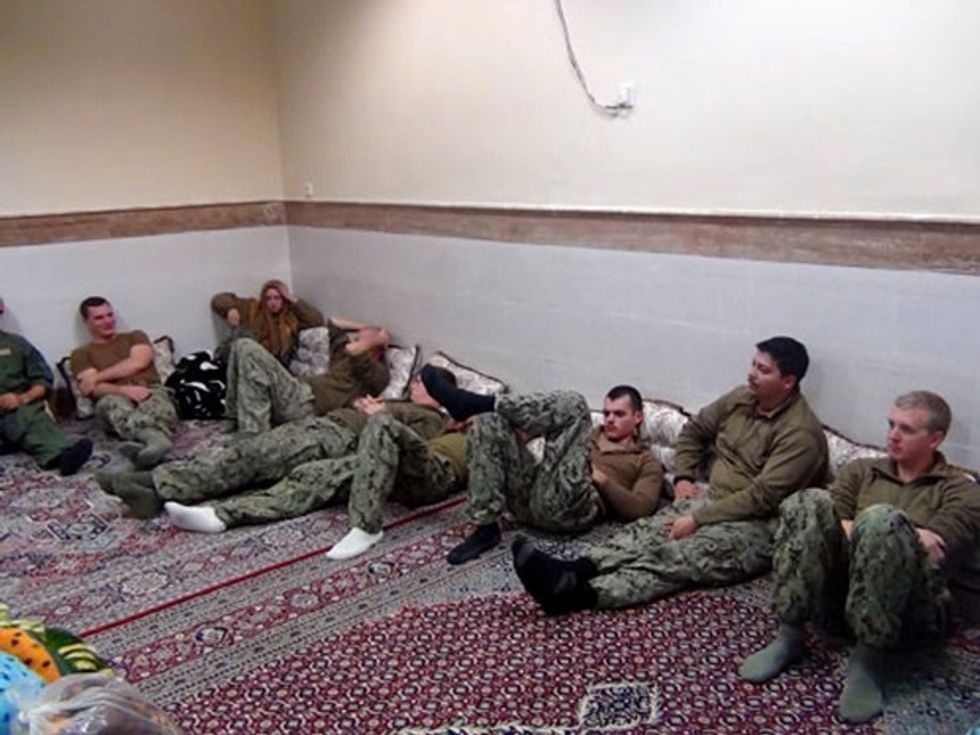WASHINGTON (AP) -- Weak leadership, poor judgment, a lack of "warfighting toughness" and a litany of errors led to the embarrassing capture and detention by Iran of 10 U.S. sailors in the Persian Gulf in January, according to a Navy investigation released Thursday.
Six officers and three enlisted sailors have been disciplined or face disciplinary action.
 This picture released by the Iranian Revolutionary Guards on Wednesday, Jan. 13, 2016, shows detained American Navy sailors in an undisclosed location in Iran. Iranian state television is reporting that all 10 U.S. sailors detained by Iran after entering its territorial waters have been released. Iran's Revolutionary Guard said the sailors were released Wednesday after it was determined that their entry was not intentional. (Sepahnews via AP)
This picture released by the Iranian Revolutionary Guards on Wednesday, Jan. 13, 2016, shows detained American Navy sailors in an undisclosed location in Iran. Iranian state television is reporting that all 10 U.S. sailors detained by Iran after entering its territorial waters have been released. Iran's Revolutionary Guard said the sailors were released Wednesday after it was determined that their entry was not intentional. (Sepahnews via AP)
The partially censored report also cited instances of unnamed sailors violating the military's code of conduct while in captivity. One sailor made "statements adverse to U.S. interests" during interrogation. A different sailor encouraged fellow crewmembers to eat food offered to them while being videotaped by the Iranians.
A sailor was said to have failed to uphold the code of conduct standards when he ordered crewmembers to cooperate with the Iranian video production and "acquiesced" in making an Iranian-scripted statement on camera in exchange for the crews' release.
Officials said that as a result, the Navy is stepping up training in adherence to the code of conduct.
The trouble for Riverine Command Boats 802 and 805, each with five sailors aboard, began even before they left port in Kuwait Jan. 12 on a short-notice, 300-mile journey to Bahrain, home of the Navy's 5th Fleet. They were delayed, unprepared, poorly supervised and ill-suited for the mission, the report said.
At least one sailor had been up all night with boat repairs. Their higher headquarters failed to arrange air or surface monitoring of the boats' transit. Such monitoring "would likely have prevented" the sailors' capture by the Iranian Revolutionary Guard Corps Navy, according to the report.
The Navy's top officer, Adm. John Richardson, presented the investigation's results at a Pentagon news conference. He declined to go into some details, saying he must not be seen as influencing the outcome of disciplinary actions that in some cases have not been completed.
Last week the Navy announced the firing of Capt. Kyle Moses, who was commander of the Navy task force that was in charge of the boats during their mission.
Richardson the scope of problems uncovered in the investigation was so great that the embarrassing episode will become a case study.
"This will be something we can mine for a lot of lessons," he said.
The lengthy investigation concluded that while the boat crews erred in entering Iranian waters, the Iranians violated international law by impeding the boats' "innocent passage," and violated U.S. sovereign immunity by boarding and seizing the boats.
"Those boats and crewmembers had every right to be where they were that day," Richardson said, even though they got there by mistake.
In addition to the range of problems that plagued the crew and the sailors' chain of command, the incident has raised questions about the Navy's preparedness in a waterway known to pose risks amid tensions between the U.S. and Iran.
The trip planning "ignored established crew rest directives and sound navigational practices," the report said.
The boat crews had planned their route but made an unauthorized deviation that took them into Saudi and Iranian territorial waters. More mistakes followed as both boats stopped inside Iranian waters while one crew was attending to an engine failure. They could see Iran's Farsi Island in the distance but thought it was Saudi territory.
Other rules were "ignored for convenience," resulting in the boats being "unable to present the appearance of a hard target or to defend themselves against (Iranian) aggression." The Iranians boarded the U.S. boats, confronted the sailors at gunpoint and took them to Farsi Island, where they remained overnight before being released after Washington intervened.
"Decision-makers at every level failed to intervene when the boats could not achieve minimum communications standards ... and when the (boats) violated Saudi and Iranian territorial seas," the report said.
—

 This picture released by the Iranian Revolutionary Guards on Wednesday, Jan. 13, 2016, shows detained American Navy sailors in an undisclosed location in Iran. Iranian state television is reporting that all 10 U.S. sailors detained by Iran after entering its territorial waters have been released. Iran's Revolutionary Guard said the sailors were released Wednesday after it was determined that their entry was not intentional. (Sepahnews via AP)
This picture released by the Iranian Revolutionary Guards on Wednesday, Jan. 13, 2016, shows detained American Navy sailors in an undisclosed location in Iran. Iranian state television is reporting that all 10 U.S. sailors detained by Iran after entering its territorial waters have been released. Iran's Revolutionary Guard said the sailors were released Wednesday after it was determined that their entry was not intentional. (Sepahnews via AP)





